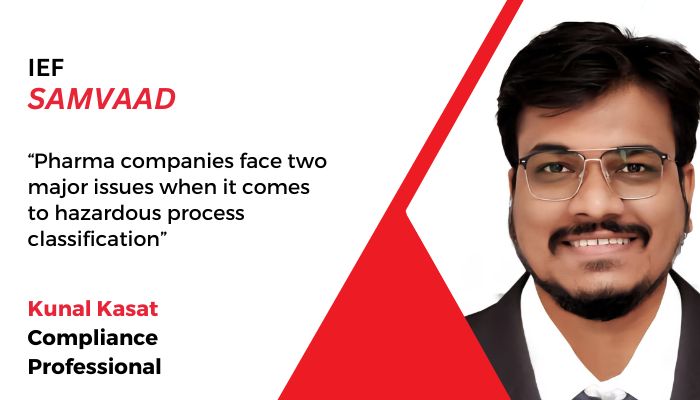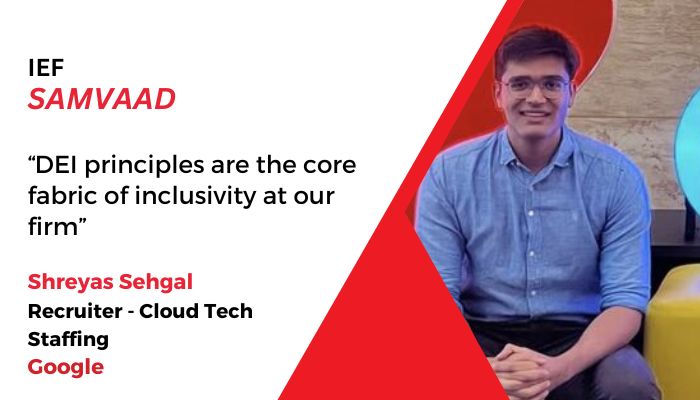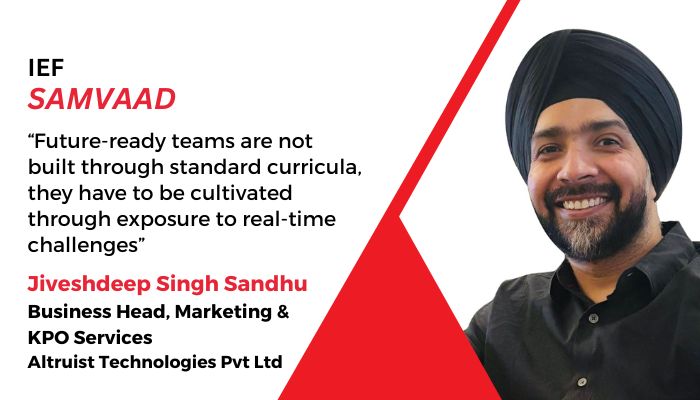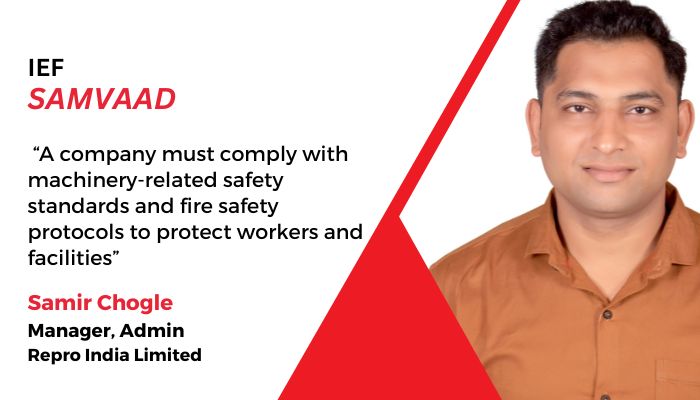Raj Tanwar, Chief Strategy Officer & HR Head, Advantage Club speaks to India Employer Forum about improving inclusivity in the workplace, easing the compliance burden, bridging the skill gap and creating a healthy talent pipeline and also the current and future role of HR Tech in HR.
Q. Tell us a little about yourself.
Currently, I am working as the Chief Strategy Officer and HR at the HR Tech platform, the Advantage Club. We are one of the world’s largest employee-rewarded engagement platforms. Before this, I was working as the head of HR for Concentrics, managing India, Malaysia, Vietnam, Thailand and Indonesia. I have also previously worked in various capacities in HR roles across organisations. From a qualification standpoint, I’m a graduate of Symbiosis plus an MBA. I’ve done some work in the HR industry, which has also brought me some accolades. I received the Great People Manager Award for 2020 from GMI in Forbes India, and there were 6 more awards during this same time that I got from big publication houses. I was also awarded the 100 most influential tech HR leaders in India by the World HRD Congress. In my free time, I am an avid video editor. I run a formal YouTube channel as a tech reporter. I love travelling and have covered about 52 countries across the world.
Q. What are the three most effective steps/policies that have improved inclusivity in your organisation?
I have been in this industry for 2 decades. One thing I have realised is that as the years pass, the workforce is getting highly diverse. It has become a reality, and being inclusive is the need of the hour. Now, the question and the more significant part is, what do we do to make it work? One of the practical steps or policies that I have taken in my past or my present role that helps my organisation build inclusivity is that it has to be a part of your culture, imbibed by design. In one of my previous organisations, we didn’t have value statements, but we had cultural statements that define who you are. In those definitions, it was evident that I could be contrarian, I could be bold, and I could be coming in from any view, but my opinions can’t screen my culture or religion. So, wherever I come in, the organisation will respect my diversity and orientation.
The second thing that I would like to talk about is a tiny little initiative that I tried, and it works wonderfully well. We call it the listening circle. Whenever somebody has any concern, suggestion, or anything to talk about, there is an area for a hearing, and that is very important. Often, when people will come to you, they either come with a query or a suggestion, a feeling which if there is nobody to hear. Then, it becomes a matter of concern and eventually escalation. People feel that their ideas are not heard or have been ignored, and that’s a fundamental rule of employee experience or customer experience. Listen to your employees and your customers first if you want to create a tremendous inclusive environment.
We call a group of people in a room with a moderator, and they express themselves freely. Things discussed in other forums are not part of this. Third, I would say include a three-step process in your organisation. Engage people first by design, then don’t forget to reward whoever has shown the best and once your reward, then do not shy away from going out in public and socially celebrating it together.
Q. What are your views on the current and future role of HR Tech in the HR function? How can HR Tech be utilised to provide a competitive advantage to Employers?
One thing we must accept in today’s world is that the workforce has become diverse and dispersed. The impact of technology is inevitable, the way we live is inevitable, and the way we work is inevitable. Events like the pandemic have multiplied the pace of technology, even at work. When I talk about the post-pandemic era, we are talking about big data, artificial intelligence, blockchain, bots, internet of things, meta-universe, human-computer, and all of this is functioning either solo or hybrid across various platforms to make sure that by the end of the human resources function is utilising them for the betterment of their employees.
In my view, the future of HR is full of technology, and I will not be shocked if some kind of technology is already infused into the HR function like digital HR. Why we are going with the flow is for our employees. We’re doing it to make sure that we have a better employee experience since a better employee would serve a customer better, and a better customer would give you better profits, which will benefit the entire ecosystem.
Q. India’s compliance universe has more than 69,000 compliances that a businessman has to adhere to, out of which more than 26,000 have clauses for imprisonment. What is your view on this, and how can the government help ease the compliance burden on employers?
In my opinion, the greater purpose of compliance is fundamental, but you will comply only if you understand. However, many of our compliances are there to catch you when you do something wrong rather than enabling you to do the right things, which needs to change. There are so many compliances in India and if you are doing business in this country, you need support from service providers, consultants and compliance authorities that help corporate houses.
There are also some automated solutions, including HR Tech, wherein you can buy an off-the-shelf solution, which can help you to understand if you’ve been following certain labour laws or not. I ask the government of India to speed up the process of coming up with the four labour codes very soon.
Q. Skill gap has been a growing concern, especially in the digital transformation era, leading to unemployability problems. What are the ways in which organisations can build a high-quality pipeline of talent to overcome this gap?
Since we’re talking about digital transformation, let me take you four or five years back when there was a digital world which existed, and many communities were trying to define the digital space. In the last 5 years, the definition of digitisation has changed and has grown from what it was to what it is today. Also, in the last 5 years, every university has had a course on digital, which wasn’t the case earlier. So the beauty of digital is that awareness is created much more than what it’s expected to be. Secondly, there are YouTube and Whatsapp Universities when solutions started coming across.
There are also formal eLearning platforms which have offered it as a course with great content with some of the best experts in the industry. Once awareness was built, people tried to acquire it as a skill. The last thing left was an experience, which was also fulfilled through apprenticeship programs.
Raj brings over two decades of global, cross-cultural HR expertise in geographies like Asia Pacific, the Middle East, Africa, Russia and Europe, working across diverse industries such as IT/ITES, Engineering, Manufacturing, Oil & Gas and Pharmaceuticals to name a few.
At present he is working as Chief Strategy Officer and Head HR for Advantage Club. AC is a global HR Technology (SaaS) platform catering to employee engagement, financial wellness, benefits, perks, rewards, and early wage access on a single platform to enrich the Employee Experience journey at Moment that matters ! Headquartered at Delaware, Advantage Club has an impressive presence in almost 100+ countries across the globe, catering to 500+ corporates and extends offers exclusively across 10,000+ Brands.
In his previous role, Raj was responsible for heading the Global Digital Talent strategy for Concentrix across 40 countries. He also led the line HR function for 70,000 employees across 13 cities in India and ASEAN countries. Raj was instrumental in expanding the company’s footprint in countries like Malaysia, Indonesia, Thailand, Vietnam and the UAE. Additionally, he pioneered the automation and transformation of the HR function at Concentrix. For his varied contributions, he is also the proud recipient of six individual industry awards:
– Great People Manager Award – Great Manager Institute and Forbes India (2020)
– TA Pai Young HR Leader Award – People Business and Economic Times (2020)
– Great Manager Award – People Business and Economic Times (2019)
– Times Ascent Asia Pacific HRM Awards – HR Tech Projects of the Year (2019)
– ACEF Asian Awards for excellence in HR – HR Leader of the Year (2018)
100 Most Influential Tech HR Leaders – Individual Award (2018)He is a certified M&A Specialist from Aon Hewitt. His formal qualifications are PGDM from Symbiosis and further education in Digital Transformation from Columbia Business School, Managerial & Leadership Effectiveness from IIMA and Design Thinking & Innovation from Emeritus, Singapore. Known as “TrueTech Reporter” at YouTube, Raj spends his leisure time in reading, video editing and music mixing.





